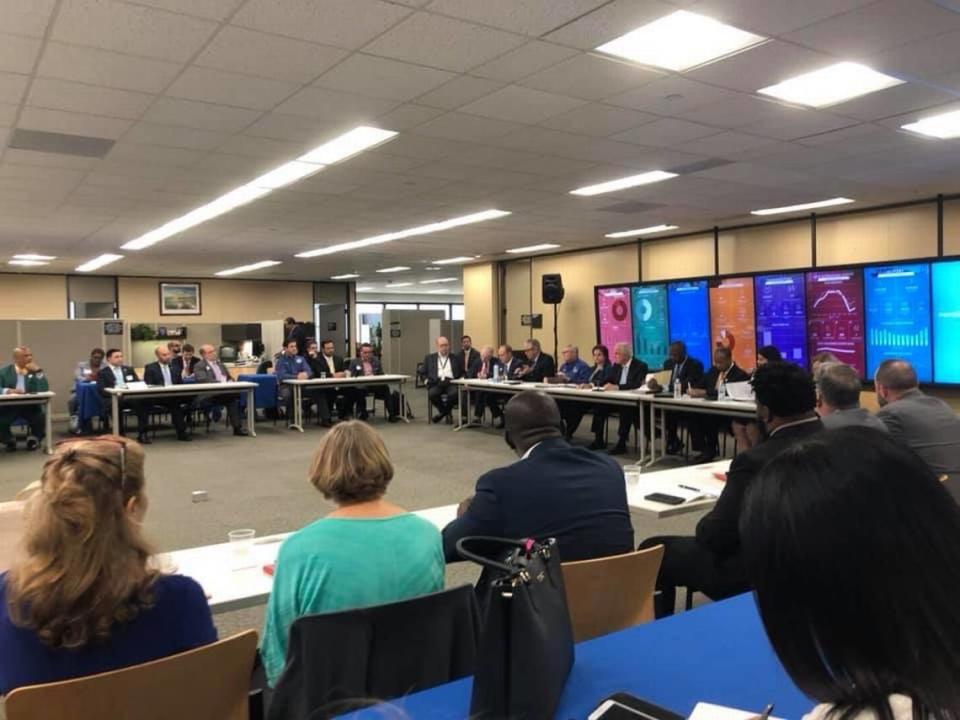Coronavirus fears have cities planning for a crisis. But when to hit the panic button?
Zoning hearings by telephone? Postponed jury trials? Or just extra hand sanitizer for the church fair?
Local governments are grappling with the best response to coronavirus risks and how far to go in getting ahead of worst-case scenarios. As this week showed, there’s no consistent answer or approach from elected officials in Miami-Dade.
A day after Miami canceled the March dates for the Ultra Music Festival, Hialeah on Thursday announced the cancellation of all city-run events for the month. Hialeah released the news shortly before a meeting with city leaders and Miami-Dade’s mayor, who said the county didn’t yet see a need to scrap large gatherings, including this month’s Youth Fair on county-owned grounds in the Kendall area.
Manny Cid, mayor of Miami Lakes, said he’s been fielding questions from residents about this weekend’s annual Our Lady of the Lakes spring festival. Leaving the 29th floor County Hall meeting with more than three dozen mayors, city managers and other government officials, Cid said he heard no reason to change plans beyond taking extra efforts to promote hand washing and sanitation.
“It’s 100 percent still on,” Cid said. “Based on what we heard today: Live a normal life.”
County Mayor Carlos Gimenez said local governments should be focusing on vulnerable populations, including senior citizens, stepped-up sanitization, and encouraging all residents to be methodical in hand washing and sensitive to symptoms they might be sick. But he said the more drastic steps of curtailing public gatherings isn’t needed, based on advice from the administration of Gov. Ron DeSantis and guidelines from the federal Centers for Disease Control and Prevention on coronavirus risk.

“The county’s position is cities have the right to cancel events that they’re sponsoring or are happening on their properties. The county has no plans to cancel its events, because we are following the advice of the CDC and the state surgeon general,” Gimenez said. “We should live our lives normally. The risk is low. That could change tomorrow.”
Sally Philips, the new mayor of South Miami, said she thought the city’s priority should be on public education about how to block the spread of the coronavirus. “We’re going to put up a lot of posters and tell people what to do,” she said after the meeting.
What happens to public meetings during a coronavirus quarantine?
A lawyer representing multiple cities in South Florida wants the state to help local governments prepare for drastic quarantines by authorizing public meetings to be conducted by telephone or video conference.
Law firm repping Aventura, Homestead & other small cities asking @GovRonDeSantis to allow “remote” govt meetings w/out public or elected officials there — everyone participating by phone/video. Not asking to hold those meetings now, but if coronavirus quarantines become an issue pic.twitter.com/pJGphS6Ud3
— Doug Hanks (@doug_hanks) March 4, 2020
Jamie Alan Cole is a partner at Weiss Serota, a law firm that serves as in-house counsel for Aventura, Homestead and 17 other municipalities across Florida. On Wednesday, he wrote DeSantis to request the governor use his emergency powers to suspend rules on government meetings that require the public be admitted and that elected officials vote in person.
Cole said the waiver should only be granted in areas where a coronavirus quarantine has been imposed, or where health authorities “are recommending isolation or the avoidance of public gatherings.” The waiver would let elected officials meet quorum requirements by calling in, and could restrict public participation to via web camera, telephone, or even email.
“Encouraging the public to attend such meetings ... could potentially promote further community spread” of coronavirus, Cole wrote. DeSantis has not responded to the request.
John Herin, an attorney at Fox Rothschild who works for Biscayne Park and other local governments around South Florida, said the letter could push Florida into “uncharted territory” on questions about government transparency.
The Florida Attorney General’s Office has issued opinions related to the use of technology when elected officials are unable to attend public meetings, but has generally held that an in-person quorum is required.
“That’s the whole purpose of having a public meeting, particularly if items require public comment,” Herin said. “I think that’s the difficulty in the governor potentially issuing an emergency order allowing the meetings to take place remotely.”
Ultra got canceled in Miami, but what are other cities doing?
So far, the most drastic action from South Florida governments on the coronavirus involves the Ultra Music Festival scheduled for the weekend of March 20-22 in downtown Miami. After Miami Mayor Francis Suarez raised public concerns about continuing with the international draw, Ultra and the city opted Wednesday to cancel the planned event. Suarez did not attend the meeting called by Gimenez on Thursday, but his newly appointed city manager, Art Noriega, did.
Brent Latham, the mayor of North Bay Village, said Ultra came up during the Gimenez meeting, including the “logic” of when to cancel an event over the coronavirus. Gimenez had said earlier in the week that the county saw no reason to cancel Ultra, but also said Miami was free to make its own decision for an event occurring in a city park.
Latham, who leads a village with fewer than 9,000 residents, said he didn’t see many parallels in the potential coronavirus complications from a world-famous electronic-music event attracting an estimated 170,000 people and any gatherings planned in North Bay Village. At least for now.
“There’s really no cause to suspend city events of the scope that we would have in our village,” Latham said. “We would certainly err on the side of caution in terms of canceling public events. We’re not there today.”
